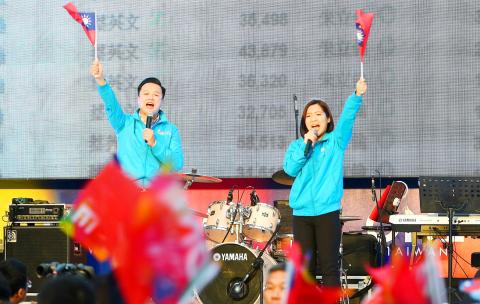A group of young Chinese Nationalist Party (KMT) members yesterday announced the formation of the “Grassroots Alliance” (草協聯盟), which aims to transform the party via a “guerrilla reformative project” that aims to address issues such as intra-party democracy.
The group includes KMT Youth League Secretary-General Lee Zheng-hao (李正皓), KMT International Information and Events Center director Hsu Chiao-hsin (徐巧芯), KMT Youth League chief Hsiao Ching-yan (蕭敬嚴) and former league chief Lin Chia-hsing (林家興).
The group called on the party and its members to support the project, which has six aims: To establish intra-party democracy, encourage young people to participate in politics, reform party affairs, solve the party’s dilemma over its assets, and stimulate debates over the party’s cross-strait policies and its identity narrative.

Photo: CNA.
Those who intend to run for the party’s chairmanship should reveal their intentions and set out concrete policies detailing in which direction they would take the party, the group said, adding that at least one policy presentation event and one debate should be held before the election.
The requirement that candidates should have served on the party’s Central Committee should be scrapped, the group said.
“Five percent of county and city councilor candidates fielded by the party should be younger people,” the alliance said. “The party should also set up a reform committee to reflect on the causes of the party’s electoral rout and committee members should not be restricted to party members.”
“The party’s assets have become the KMT’s debt,” Lee said. “The party should, while maintaining current and retired party workers’ benefits, formulate clear principles to manage its assets that meet the public’s expectations.”
“Only when the party’s dilemma over its assets is dealt with definitively will the KMT behave like a normal party — counting every cent it spends,” Lee said.
With regard to the party’s identity, Hsiao said that as Taiwanese adhere to different ideologies and national identities, the party should hold a debate on the direction of its cross-strait policies and formulate a position that is suitable for Taiwanese as a whole.
“The party’s stance that the Republic of China is the nation’s core value and Taiwan its identity should be rethought,” he added.
Hsu called on young people who support the KMT to become members and exercise their rights to join party representative elections and reform the party.
“We are going to promote our reform ideas by making public speeches in the six special municipalities starting from next week, and we also plan to launch a signature drive to solicit more support,” Hsu said.

INVESTIGATION: The case is the latest instance of a DPP figure being implicated in an espionage network accused of allegedly leaking information to Chinese intelligence Democratic Progressive Party (DPP) member Ho Jen-chieh (何仁傑) was detained and held incommunicado yesterday on suspicion of spying for China during his tenure as assistant to then-minister of foreign affairs Joseph Wu (吳釗燮). The Taipei District Prosecutors’ Office said Ho was implicated during its investigation into alleged spying activities by former Presidential Office consultant Wu Shang-yu (吳尚雨). Prosecutors said there is reason to believe Ho breached the National Security Act (國家安全法) by leaking classified Ministry of Foreign Affairs information to Chinese intelligence. Following interrogation, prosecutors petitioned the Taipei District Court to detain Ho, citing concerns over potential collusion or tampering of evidence. The

‘FORM OF PROTEST’: The German Institute Taipei said it was ‘shocked’ to see Nazi symbolism used in connection with political aims as it condemned the incident Sung Chien-liang (宋建樑), who led efforts to recall Democratic Progressive Party (DPP) Legislator Lee Kun-cheng (李坤城), was released on bail of NT$80,000 yesterday amid an outcry over a Nazi armband he wore to questioning the night before. Sung arrived at the New Taipei City District Prosecutors’ Office for questioning in a recall petition forgery case on Tuesday night wearing a red armband bearing a swastika, carrying a copy of Adolf Hitler’s Mein Kampf and giving a Nazi salute. Sung left the building at 1:15am without the armband and apparently covering the book with a coat. This is a serious international scandal and Chinese

Seventy percent of middle and elementary schools now conduct English classes entirely in English, the Ministry of Education said, as it encourages schools nationwide to adopt this practice Minister of Education (MOE) Cheng Ying-yao (鄭英耀) is scheduled to present a report on the government’s bilingual education policy to the Legislative Yuan’s Education and Culture Committee today. The report would outline strategies aimed at expanding access to education, reducing regional disparities and improving talent cultivation. Implementation of bilingual education policies has varied across local governments, occasionally drawing public criticism. For example, some schools have required teachers of non-English subjects to pass English proficiency

TRADE: The premier pledged safeguards on ‘Made in Taiwan’ labeling, anti-dumping measures and stricter export controls to strengthen its position in trade talks Products labeled “made in Taiwan” must be genuinely made in Taiwan, Premier Cho Jung-tai (卓榮泰) said yesterday, vowing to enforce strict safeguards against “origin laundering” and initiate anti-dumping investigations to prevent China dumping its products in Taiwan. Cho made the remarks in a discussion session with representatives from industries in Kaohsiung. In response to the US government’s recent announcement of “reciprocal” tariffs on its trading partners, President William Lai (賴清德) and Cho last week began a series of consultations with industry leaders nationwide to gather feedback and address concerns. Taiwanese and US officials held a videoconference on Friday evening to discuss the